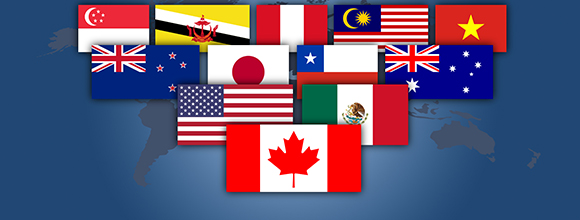In 2001, the World Trade Organization took a massive step towards helping some of the world’s most vulnerable populations. The WTO announced its Agreement on Trade-Related Aspects of Intellectual Property Rights (TRIPS), resulting in a ground-breaking declaration. While recognizing the importance of intellectual property rights to the viability of pharmaceutical companies, the organization granted immense flexibility to governments to interpret such principles as necessary in the name of public health and access to medicines for all. Countries would no longer be precluded from providing life-saving medicines in emergency situations by stringent patent laws.
However, as the Canadian government negotiates the terms of the Trans-Pacific Partnership (TPP) trade agreement, it appears that certain stipulations in the deal may serve to undermine the patent flexibility granted by TRIPS. The Trans-Pacific Partnership is a wide-ranging free trade agreement (FTA) with negotiations currently underway between twelve countries, rich and poor, in the Asia-Pacific region. The end result of the TPP, as presently formulated, on Canada’s ability to manufacture and export cheap generic medicines to the world’s poorest populations suffering from HIV/AIDS, malaria, and tuberculosis could be devastating.
The TRIPS Agreement sought to take advantage of a principle known as compulsory licensing. Pharmaceutical companies would be required to license their patents to generic drug companies for the production and export of cheap drugs to impoverished populations unable to afford brand name medicine. The results were staggering: a 99% decrease in the cost of antiretroviral drugs to treat HIV/AIDS from 2000 to 2013. This thriving export market for generics has been driven by countries such as India, home to 11 of the 50 largest generic drug manufacturers.
In an effort to increase the Canadian contribution to the global fight against such diseases, the Canadian government established Canada’s Access to Medicines Regime (CAMR) in 2004. This institution provided a mechanism for Canada to export affordable, life-saving medicines to those in developing countries. However, the system has been a colossal failure. Owing to red tape and cumbersome bureaucratic procedures, Canada has only exported one medicine to one country over the course of CAMR’s 10 year history.
In recent years, legislation has been proposed to improve CAMR’s effectiveness. The first attempt in 2011 through Bill C-393 would have cut through red tape with a proposed ‘one-license solution,’ making it easier for generics to have their medicines approved and exported. But, after the bill passed in the House of Commons by a margin of 61 votes, Conservative Minister Tony Clement sent a letter encouraging Conservatives in the Senate to oppose the measure, delaying a vote until the government fell in a vote of non-confidence.
The next effort to reform CAMR was Bill C-398 in 2012, a reiteration of the previous bill, more or less. The bill—which was supported by 80% of Canadians—was defeated in the House of Commons by seven votes. Seven Conservative MPs voted for the bill, while 14 who had formerly backed the bill voted against it. While opposition parties supported the measure, one member of the Bloc Quebecois and four Liberals were absent for the vote (including then-leadership candidate Justin Trudeau, who was out of town at a fundraiser). Domestically, the future of CAMR has looked bleak ever since.
But, as concerning as Canada’s performance in exporting generic drugs has been, it is poised to get worse. The text of Canada’s Comprehensive Economic Trade Agreement (CETA) with the European Union was finalized this past Tuesday. While details have not been released, there have been leaks describing the content of the bill, and the news has not been encouraging for Canadian generics manufacturers—and sets a disturbing precedent for what we may expect from the TPP. The trade deal has reportedly been celebrated by Canada’s Research-Based Pharmaceutical Companies (Rx&D) for a number of measures that are said to have been included. One such measure is the prolongation of patent terms by two years that would prevent generic manufacturers from gaining access to more up-to-date medicine. The implementation of a new patent appeal procedure would also act as a hurdle to generic drug companies. Once it is officially signed and executed, CETA will likely serve as not only a roadblock to Canada’s continued contribution to fighting HIV/AIDS, malaria, and tuberculosis, but also as a harbinger of what to expect from the largest trade deal on Canada’s horizon: the TPP.
While talks on the TPP have taken place behind closed doors, carefully guarded from public view, there have been leaks which may give an idea of what to expect from a final version. The United States has reportedly pushed to “extend patent and regulatory monopolies through the TPP,” with Médecins Sans Frontières/Doctors Without Borders asserting that the American proposals included terms “that represent the most far-reaching attempt to date to impose aggressive IP standards in a trade agreement with developing countries.” Meanwhile, reports of Canada’s stance have been conflicting; some have hinted that Canada has opposed such extreme measures, while others observe that “the government appears to be leaning towards backing big pharma,” building off the more stringent intellectual property (IP) provisions of CETA. Given the Canadian government’s recent track record on this issue and Trade Minister Ed Fast’s public comments extolling the virtues of a “strong intellectual property regime,” it seems unlikely that Canada will draw a hard line at the negotiating table in defense of generic manufacturers or the vulnerable populations they aim to help.
As Canada seeks to balance a strong IP regime that protects research and development for medicines with a thriving generic drug industry that can provide affordable medicines to all who need them, it appears that the scales are tipping in favour of the former. While strong IP protection is very important for R & D and the capabilities of pharmaceuticals to create cutting-edge medicine, it is equally important that this balance with generics be struck, so that such drugs may be available to those in need. As free trade deals are central to the country’s ability to produce and export such affordable medicines, the recent string of FTAs may serve to hinder the already-floundering work of CAMR and pose an obstacle to what TRIPS set out to accomplish. With more IP restrictions from the TPP on the horizon, the news may get even worse for those hoping to see Canadian generics play an important role in the global fight against deadly diseases. If such deals are any indication, the tradeoff of free trade for cheap medicines is a very real one.





